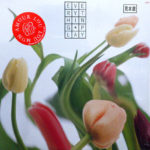
For some reason, I’ve been sitting on this album for a long while just waiting for the right season to share it. It’s Everything Play’s Lou Lou Mon Amour (ルール・モナムール) who I owe a huge debt of gratitude to one fellow reader, Wes Almond, who has an equally fascinating Youtube channel who we all should make sure to subscribe to as a token of gratitude — go for the tunes, stick around for the bomb skating videos. Continuing on, for once, you can perfectly judge this album by its cover. A continuation and expansion on Sohichiro Suzuki’s (sometimes spelled Soichiro Suzuki) wonderful work as World Standard, on Harry Hosono’s Non-Standard label, as Everything Play he attempts to cross the bridge from Japanese New Age (or I should more properly say, Japanese Neo-Exotica, hello Yann Tomita…) into the Pop world and absolutely nails his first full flight there.
 Recorded a year after his sophomore effort as World Standard started to stall, and released on experimental Japanese group Hikashu’s Koh Hak label, Everything Play took a turn to remix, rejigger, and reassess influential Pop music by the likes of early Paul McCartney, Harry Nilsson, Van Dyke Parks, and Paul Williams into new, fascinating territory that only contemporary digital synthesis and sampling could take it, perhaps updating Harry Hosono’s own early, tropical dandy music for a newer generation. Jen, highlighted perfectly his macro take on global “exotica” in World Standard. Now, as Everything Play, here it seems to go a bit more personal, while remaining true to his vision of doing things differently. You’d think this means more navel gazing, but to my surprise on Lou Lou Mon Amour (ルール・モナムール), it appears things feel a lot more joyful, tender, and yearning. Like I said, if you can imagine McCartney’s Ram transmuting itself Japanese into the concluding techno-pop era, you’ll sort of get what this aspires to be (and definitely sounds like).
Recorded a year after his sophomore effort as World Standard started to stall, and released on experimental Japanese group Hikashu’s Koh Hak label, Everything Play took a turn to remix, rejigger, and reassess influential Pop music by the likes of early Paul McCartney, Harry Nilsson, Van Dyke Parks, and Paul Williams into new, fascinating territory that only contemporary digital synthesis and sampling could take it, perhaps updating Harry Hosono’s own early, tropical dandy music for a newer generation. Jen, highlighted perfectly his macro take on global “exotica” in World Standard. Now, as Everything Play, here it seems to go a bit more personal, while remaining true to his vision of doing things differently. You’d think this means more navel gazing, but to my surprise on Lou Lou Mon Amour (ルール・モナムール), it appears things feel a lot more joyful, tender, and yearning. Like I said, if you can imagine McCartney’s Ram transmuting itself Japanese into the concluding techno-pop era, you’ll sort of get what this aspires to be (and definitely sounds like).
What’s most surprising about his work here is how much of it is actually populated by non-electronic music. Mostly driven by Sohichiro’s innocent-sounding guitar work, Lou Lou Mon Amour (ルール・モナムール) fills its world with all sorts of dainty instruments like toy pianos, ukuleles, xylophones, and pocket trumpets as if it wanted to show how one can use them as orchestra, to mine a wall of sound, full of sort of interesting tidbits. The title track, which kicks off the album, perfectly encapsulates this most Van Dyke Parksian of idea. Strains of easy listening give you a false sense of complacency as Sohichiro dives into a widescreen vision where pleasurable melodies (and countermelodies) and cute sonic odds and ends (my favorite is that pitched-tune background vocal thing) zig-zag the mood of the song to its graceful, jaunty end.
“Amitie, Amour” takes a tiny bit of liberty with some tossed off Elton John sonic ephemera from “Benny and the Jets” and creates this whole brilliant slice of proto-Pizzicato Five (old label cohorts), Alternative Pop music. The album’s more electronic songs (the few that exist) like “Elfe” and “S.A.Y.O.N.A.R.A” treat the sonic toys like latter-day Stereolab and all the more POP, than Pop music, artists from the Elephant 6 catalog would. For me, though, my favorite moments (at this time) are those bittersweet ones from songs like “Olive Blue” or “A Moment For Lovers” that sound like lost Beach Boys’ Surf’s Up or Sunflower weepies. On the latter, just try to pick up how many mini suites and spirit changes he is able to affect, in a 3:30 minute Pop song. However, I can hear (on special days) how gorgeous Techno-Americana like “Passion D’Amore” can truly put you in a special place.
At less than 30 minutes, probably far shorter than the amount it took for me to write this point — and you to read it (ouch!) — Lou Lou Mon Amour (ルール・モナムール) always brings me back because of songs like “Holiday” which are Sohichiro at his most affecting. A simple song featuring as many instruments as you have digits on one hand, it gets its most sublime memories by using the “tricks” only reserved (and used) by the best Pop-meisters. First, you stick a gorgeous harmony right before the chorus — Mikiko Ouchi who sings vocals on all this album really does something special here. Then, you put sounds that play on everyone’s nostalgia — I mean who hasn’t felt the power of sitting quietly by a river? And then just let all these (and other) intrinsically cyclical stuff ebb, back and forth, until you feel like you can crawl back into the womb. Not bad for a guy who started out as a drummer in a punk band, right? In the end, who says Sohichiro doesn’t love you, baby?
